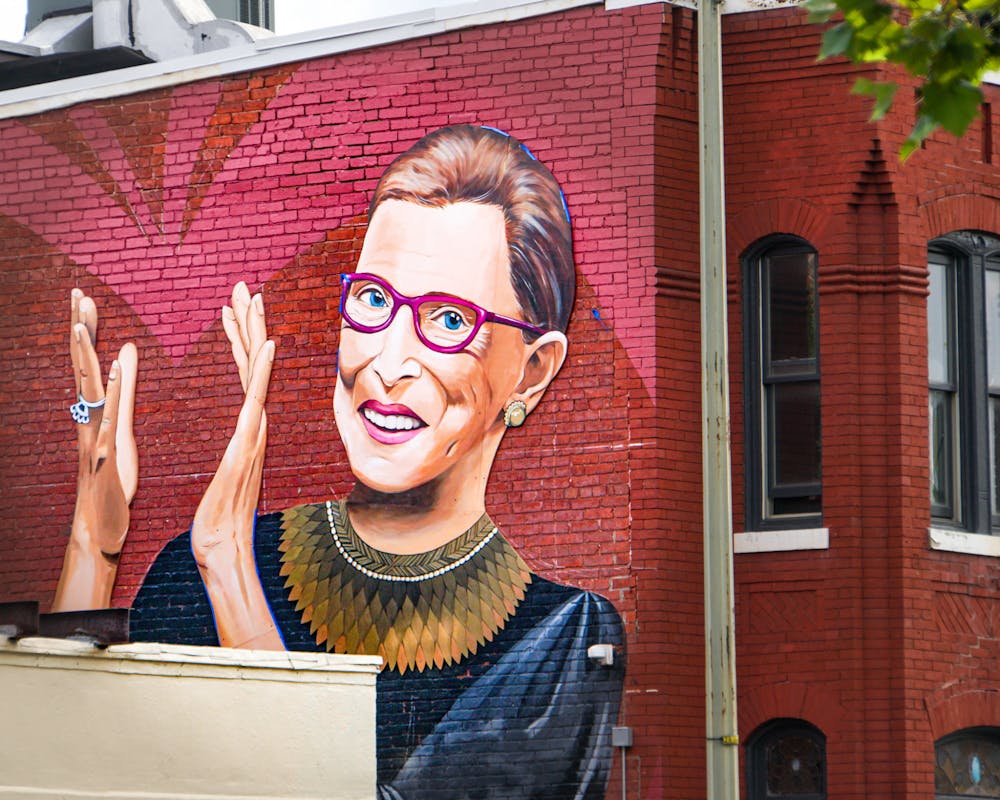On Sept. 18 of an already disastrous 2020, Supreme Court Justice Ruth Bader Ginsburg passed away due to metastatic pancreatic cancer. As much as we may have wanted her to, she could not live forever. Nevertheless, her legacy is one that moved the needle toward equality for all in our nation. This is reason enough for everyone in the U.S. to take some time to mourn and reflect on the life she led.
However, I want to speak directly to all pre-meds and future health-care professionals at Hopkins: The legacy of Ruth Bader Ginsburg matters to us as well. The success of medicine and health care relies on the principle that each person should receive the best support needed for their well-being. Ginsburg reconsidered concrete notions of gender and heteronormative standards, which harm women and men physically and mentally.
Before joining the Supreme Court, Ginsburg was one of few female undergraduates at Cornell University and only one of two women in her graduating class at Columbia Law School. Afterward, she pursued a career in civil law to curb gender discrimination throughout the country and expand equality under the law.
In 1971, she wrote the plaintiff’s brief for the Supreme Court case Reed v. Reed, which aimed to ban a provision in Idaho where men were given preference over women applicants to serve as administrator of an estate. The Supreme Court unanimously agreed to the plaintiff’s use of the 14th Amendment and banned the Idaho provision. This was the first time the Supreme Court applied the Equal Protection Clause to ban discrimination on the basis of gender, which would be a useful interpretation in Ginsburg’s continued fight for women’s rights.
Even in the moments when she did not win, Ginsburg led by example and taught us how to get back up and continue fighting. In Ledbetter v. Goodyear Tire & Rubber Co., Lilly Ledbetter sued her employer after discovering that she was making thousands less than her male co-workers in a similar role. However, the 5-4 majority argued that Ledbetter had not made her claim in a timely fashion, which prompted the most scathing dissent Ginsburg ever delivered from the bench.
Calling on Congress to act, Ginsburg criticized her male colleagues, saying that “[the] court does not comprehend or is indifferent to the insidious way in which women can be victims of pay discrimination.” Congress heard her and passed the Lilly Ledbetter Fair Pay Act in 2009 to amend the Civil Rights Act of 1964 to reset the statute limitation on equal pay.
Ginsburg has also famously been recognized for her public support of marriage equality, which represented major progress for the LGBTQ community in the U.S. In the 5-4 majority ruling, Obergefell v. Hodges made same-sex marriage the law of the land in 2015.
Just this summer, the 6-3 majority ruling on Bostock v. Clayton County made it illegal to fire an employee solely based on their sexual orientation or gender identity and subsequently from losing crucial health insurance benefits. These rulings only scratch the surface of Ginsburg’s long tenure as the second woman to sit on our highest court. More importantly, she has laid the foundation for our country to move toward a more perfect union where everyone is treated equally.
Outside of her legal career, Ginsburg was living proof that one could stay fit at any age; she continued with her intense workouts and “Super Diva” sweater well into her upper 80s. She was a symbol of hope for cancer patients, having been diagnosed five separate times and living for 21 years as a cancer patient.
Moreover, Ginsburg’s work has influenced the medical landscape by expanding opportunities for women, people of color and members of the LGBTQ community to shape their own lives. The most important mission in medicine is to support each patient in improving their quality of life, which extends beyond physical health.
It’s well known that social determinants of health such as housing, education and access to medications and food have a large impact on the well-being of patients. As aspiring doctors, researchers and health-care workers, our work ought to emphasize the unique experiences and identities of our patients so we can support their pursuit of a greater quality of life. Ginsburg moved the country in that same direction: Her work helped millions of people feel heard and accepted for the first time in our nation’s history.
As we continue to grapple with the coronavirus pandemic, the need for remedying widespread racism and an ever-intensifying election cycle, may her memory be a revolution and may she inspire us to provide greater care for all.
Javier Jurado Vélez is a senior studying Medicine, Science and the Humanities from Carolina, Puerto Rico. He is an aspiring M.D. candidate.





